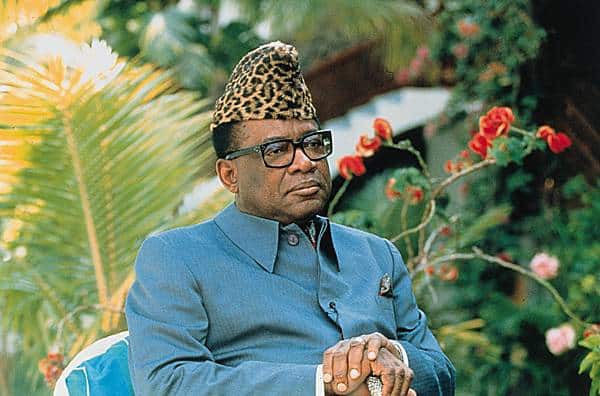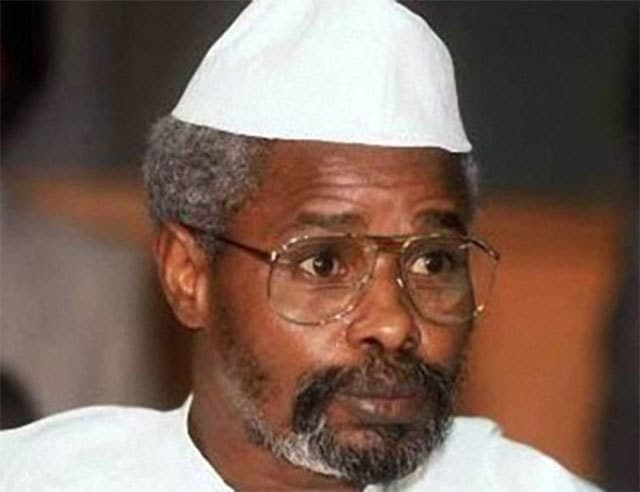10 Absolute Worst African Dictators

Many countries in Africa have been privy to the many different forms of government ranging from one end of the spectrum to the other.
Most surprisingly, some of the worst African dictators didn't even have to overthrow for power, it was given to them.
Dictatorship is one of the many forms that is even to this day still prevalent on the continent of Africa. Many African leaders take office as a democratic leader but often times, the hunger for power drives them to become dictators.
Another great read: 10 Wealthiest African Politicians
Here is a list of the ten worst dictators that Africans have ever seen in their history.
10. Charles Taylor

Country: Liberia
Charles McArthur Ghanakay Taylor’s life story is akin to that of a movie. He became the 22nd president of Liberia on August 2, 1997 and served until August 11, 2003.
Before his presidency, Taylor was accused of embezzlement, he escaped to the US abut was caught and jailed. Like the star of a movie, he soon escaped from jail and returned to Africa.
In 1997, he was elected as president. His presidency was marked with allegations of illegal trading of blood diamonds, purchasing weapons and recruiting child soldiers to aid rebels.
On August 11, 2003 he resigned after being pressured by the U.S government. In 2012 after years of trial, Taylor was convicted of eleven charges.
These charges included acts of terrorism, murders, rape, sexual slavery, enslavement and enlisting child soldiers..
9. Mobutu Sese Seko

Country: Democratic Republic of the Congo
Mobutu Sese Seko, born Joseph-Dèsirè, served as President of the Democratic Republic of the Congo from 1965 to 1997 after seizing power in a coup.
Mobuto while in office to tried to boost economic growth by nationalizing the Katanga copper mines and by trying to attract foreign investors. He even changed the name of the country to the Republic of Zaire.
However, no economic growth occurred. Instead, the country suffered from hyperinflation, increasing debt and extreme currency devaluations.
While the citizens were suffering; this dictator built his personal fortune from the coffers of the country and corruption.
In May 1997 he was ousted by rebel forces and three months later he died from prostate cancer in Morocco.
8. Robert Mugabe

Country: Zimbabwe
Robert Mugabe, a man known for his sometimes very controversial comments, has served as the president of the Republic of Zimbabwe since 1987.
In 1987, Mugabe was appointed president of Zimbabwe after the constitution was amended. During the 1990s, the economy was suffering from inflation but government officials were raising their salaries.
Despite growing opposition among the people, increasing debts and a fall in the standard of living of Zimbabweans, Mugabe won elections in 2002.
In 2005, it is alleged that he won the re-elections with the help of corruption and violence and in the March 2008 re-elections Mugabe refused to give up his seat which led to violent outbreaks.
Again he won in the 2013 elections. Throughout Mugabe’s rule anyone who opposes him has been subjected to intimidation, arrests and persecution.
7. General Sani Abacha

Country: Nigeria
A Nigerian army general, Sani Abacha served as de facto president of Nigeria for the years 1993-1998. Abacha seized power in 1993 when he overthrew the government of Chief Ernest Shonekan.
Through a decree, he gave himself absolute power. Unlike other dictators that led their countries to political ruin, Abecha increased Nigeria’s foreign exchange reserves, reduced the national debt and reduced the inflation rate.
However, his government has been accused of violating human rights and Abacha and his family were accused of lining their pockets with money from the country’s treasury. Abacha was ranked as the fourth most corrupt world leader in history in 2004.
6. Macias Nguema

Country: Equatorial Guinea
Francisco Macìas Nguema was sworn in as the first president of Equatorial Guinea on October 12, 1968. He served in this position until his administration was overthrown in 1979.
After gaining office, He instituted the death penalty as punishment for those who threatened the President or the government.He appointed himself titles such as the “Unique Miracle” and “Grand Master of Education, Science and Culture.”
Crazy dictators are no stranger to history and the African continent seemed to as had its own share. Nguema ordered the death of those who wore spectacles so much so that at the end of his rule almost all of the educated class had either been executed or forced into exile.
He even had members of his own family killed. What had he been smoking?
5. Sekou Toure

Country: Guinea
Ahmed Sèkou Tourè became the first President of Guinea in 1958 and served until his 1984. Similarly to other dictators, after his election he made his party the only legal party in the state.
Toure’s aim was to make Guinea a socialist country and those who were in opposition of this were persecuted or exiled. Those who dared to make their opposition public were sent to detention camps or paid visits by the secret police.
An estimated 50,000 people are believed to have been killed under Tourè’s rule. Tourè was friends with and offered asylum to Kwame Nkrumah, former Ghannian President, Modibo Keita of Mali, Malcom X and Stokely Carmicheal.
4. Siad Barre

Country: Somalia
Mohammed Siad Barre served as the President of the Somali Democratic Republic from 1969-1991. After the assassination of Somalia’s second president,Siad Barre led a military coup to seize the government.
He appointed himself head of the Supreme Revolutionary Council. Subsequently as with all other dictators, he gave himself absolute power. During his reign, Barre raised the literacy rate among Somalis, eradicated clanism and nationalised a number of industries to foster economic growth.
However, no growth was seen. Barre’s reign has been described as an oppressive dictatorship. He persecuted, jailed and tortured those who opposed his rule and disregarded the rights of the population. He had wells poisoned, herd of animals and people machine-gunned.
3. Omar Al-bashir

Country: Sudan
Omar Al-bashir became the self appointed president of Sudan on October 16, 1993 after overthrowing the elected government in a coup d’ètat. Of course upon taking up rule he dismantled all political parties and instituted the Islamic legal code.
He has since been re-elected as the President of Sudan three times each time with allegations of corruption, fraud and intimidation marring the elections.
In March 2009, a warrant for his arrest was issued on charges of murder, extermination, rape, torture and intentionally attacking civilians but has not been arrested since.
Unlike most dictators Al-bashir’s has been credited for stimulating economic growth in Sudan. The country however was undergoing high rates of inflation in 2012 which led to riots ensuing.
2. Hissene Habre

Country: Chad
Hissenè Habrè ruled Chad as president from 1982 until 1990. Hissenè Habre’s ascension to power was aided largely by France and the United States of America. Under his rule, human rights abuse became the norm.
He created a secret police force that tortured and killed his opponents. Habre’s government practiced ethnic cleansing and the secret police killed by forcing detainees to put their mouths around car exhaust pipes and they were sprayed with gas or burned.
In May 2016 he was sentenced to life in prison on charges of rape, sexual slavery and ordering the killing of 40,000 people.
1. General Idi Amin Dada

Country: Uganda
On January 25, 1971, Idi Amin Dada overthrew Prime Minister Milton Oboto whom he served as Commander of the Army. He served as the President and military officer of Uganda from 1971 to 1979.
When Amin took over, he told the people that he would serve as caretaker until new elections took place. He also promised to release all the political prisoners.
Like a typical politician he went back on his word and announced himself as President in February, a month after the coup. Throughout his rule, it is estimated that 500,000 people were killed.
His victims included former Prime Minister Janai Luwum, journalists, lawyers, members of his own cabinet and many other prominent members of the society.
It is said that the bodies of those he killed were dumped in the River Nile.
List of African Dictators & Leaders In History
| Name | Country | In Power |
|---|---|---|
| Gamal Abdel Nasser | Egypt | 1954–1970 |
| Ahmed Sékou Touré | Guinea | 1958–1984 |
| David Dacko | Central African Republic | 1960–1966/1979–1981 |
| Kwame Nkrumah | Ghana | 1960–1966 |
| Modibo Keita | Mali | 1960–1968 |
| François Tombalbaye | Chad | 1960–1975 |
| Félix Houphouët-Boigny | Côte d'Ivoire | 1960–1993 |
| Milton Obote | Uganda | 1962–1972/1980–1985 |
| Hastings Kamuzu Banda | Malawi | 1963–1994 |
| Kenneth Kaunda | Zambia | 1964–1991 |
| Houari Boumediene | Algeria | 1965–1978 |
| Jean-Bédel Bokassa | Central African Republic | 1966–1979 |
| Gnassingbé Eyadéma | Togo | 1967–2005 |
| Omar Bongo | Gabon | 1967–2009 |
| Moussa Traoré | Mali | 1968–1991 |
| Francisco Macías Nguema | Equatorial Guinea | 1968–1979 |
| Gaafar Nimeiry | Sudan | 1969–1985 |
| Mohamed Siad Barre | Somalia | 1969–1991 |
| Idi Amin | Uganda | 1971–1979 |
| Mengistu Haile Mariam | Ethiopia | 1974–1991 |
| Olusegun Obasanjo | Nigeria | 1976-1979 |
| Jean-Baptiste Bagaza | Burundi | 1976–1987 |
| Albert René | Seychelles | 1977–2004 |
| Daniel arap Moi | Kenya | 1978–2002 |
| Teodoro Obiang Nguema Mbasogo | Equatorial Guinea | 1979–present |
| José Eduardo dos Santos | Angola | 1979–present |
| João Bernardo Vieira | Guinea-Bissau | 1980-1984/2005-2009 |
| Samuel K. Doe | Liberia | 1980–1990 |
| Robert Mugabe | Zimbabwe | 1980–present |
| Jerry Rawlings | Ghana | 1981-1992 |
| André Kolingba | Central African Republic | 1981–1993 |
| Paul Biya | Cameroon | 1982–present |
| Hissène Habré | Chad | 1982–1990 |
| Thomas Sankara | Burkina Faso | 1983-1987 |
| Maaouya Ould Sid'Ahmed Taya | Mauritania | 1984–2005 |
| Ibrahim Babangida | Nigeria | 1985-1993 |
| Zine El Abidine Ben Ali | Tunisia | 1987–2011 |
| Omar Hasan Ahmad al-Bashir | Sudan | 1989–present |
| Idriss Déby | Chad | 1990–present |
| Sani Abacha | Nigeria | 1993–1998 |
| Paul Kagame | Rwanda | 1994–present |
| Yahya Jammeh | The Gambia | 1994–Present |
| Laurent-Désiré Kabila | Congo-Kinshasa | 1997–2001 |
| Charles G. Taylor | Liberia | 1997–2003 |
| François Bozizé | Central African Republic | 2003–2013 |
| Ely Ould Mohamed Vall | Mauritania | 2005-2007 |
| Michael Sata | Zambia | 2011–2014 |
| Mohamed Morsi | Egypt | 2012–2013 |
What to read next: 10 Poorest Countries In Africa

